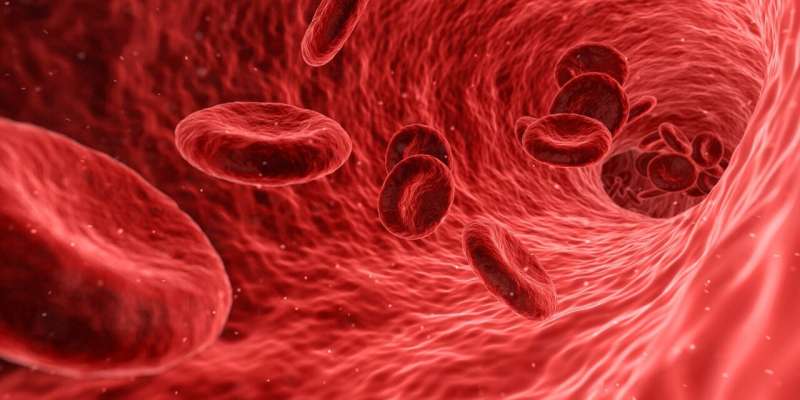This article has been reviewed according to Science X's editorial process and policies. Editors have highlighted the following attributes while ensuring the content's credibility:
fact-checked
peer-reviewed publication
trusted source
proofread
Red blood cells exposed to oxygen deficiency protect against myocardial infarction, study shows

Red blood cells exposed to oxygen deficiency protect against myocardial infarction, according to a new study published in the Journal of Clinical Investigation. The study also shows that the protective effect is enhanced by a nitrate-rich vegetable diet.
Red blood cells carry oxygen from the lungs to all of the body's cells and carbon dioxide back to the lungs. The study, conducted at Karolinska Institutet in collaboration with Karolinska University Hospital, now shows that red blood cells have an intrinsic function of protecting against heart injury caused by myocardial infarction.
The effect is enhanced by a diet containing nitrate-rich vegetables, such as arugula and other green leafy vegetables.
"This effect was also shown in a clinical study in patients with high blood pressure who were randomly assigned to eat nitrate-rich vegetables or a diet low in nitrates," says John Pernow, Professor of Cardiology at the Department of Medicine, Karolinska Institutet in Solna and senior physician at Karolinska University Hospital, and the study's corresponding author together with Jon Lundberg, professor at the Department of Physiology and Pharmacology, Karolinska Institutet.
Part of the study was conducted through experiments with red blood cells from mice that were added to a myocardial infarction model with hearts from mice. Before the experiment, the red blood cells were exposed to low oxygen pressure, while nitrate was added to the drinking water.
In a clinical study, red blood cells were collected from patients with high blood pressure who were randomly assigned a nitrate-rich diet with green leafy vegetables or a diet with nitrate-poor vegetables. These red blood cells were given to the corresponding myocardial infarction model with hearts from rats.

"The results show both that the red blood cells convey protection against injury in the heart in the event of low oxygen levels, and how that protection can be enhanced through a simple dietary advice. This may be of great importance for patients at risk of myocardial infarction," says the study's first author Jiangning Yang, a researcher at the Department of Medicine, Solna, Karolinska Institutet.
The next step in the research is to develop additional drugs that can activate the protective signaling mechanism in red blood cells to provide protection to the body's tissues and cells in the event of oxygen deficiency.
"In addition, we need to map how the blood cells transmit their protective signal to the heart muscle cells," says John Pernow.
The study is a collaboration between researchers from, among others, Karolinska Institutet, Karolinska University Hospital, Tohoku University, Japan, Heinrich-Heine-University, Germany, and Ruhr-University Bochum, Germany.
More information: Jiangning Yang et al, Hypoxic erythrocytes mediate cardioprotection through activation of soluble guanylate cyclase and release of cyclic GMP, Journal of Clinical Investigation (2023). DOI: 10.1172/JCI167693





















